Cabbage is more than just a humble vegetable; it can play a significant role in managing blood sugar levels, making it a valuable addition to a diabetic diet. Cabbage helps moderate the rise in blood sugar after meals, which is crucial for those living with diabetes. With its nutrient-rich profile, cabbage can aid in stable blood sugar management and overall health.
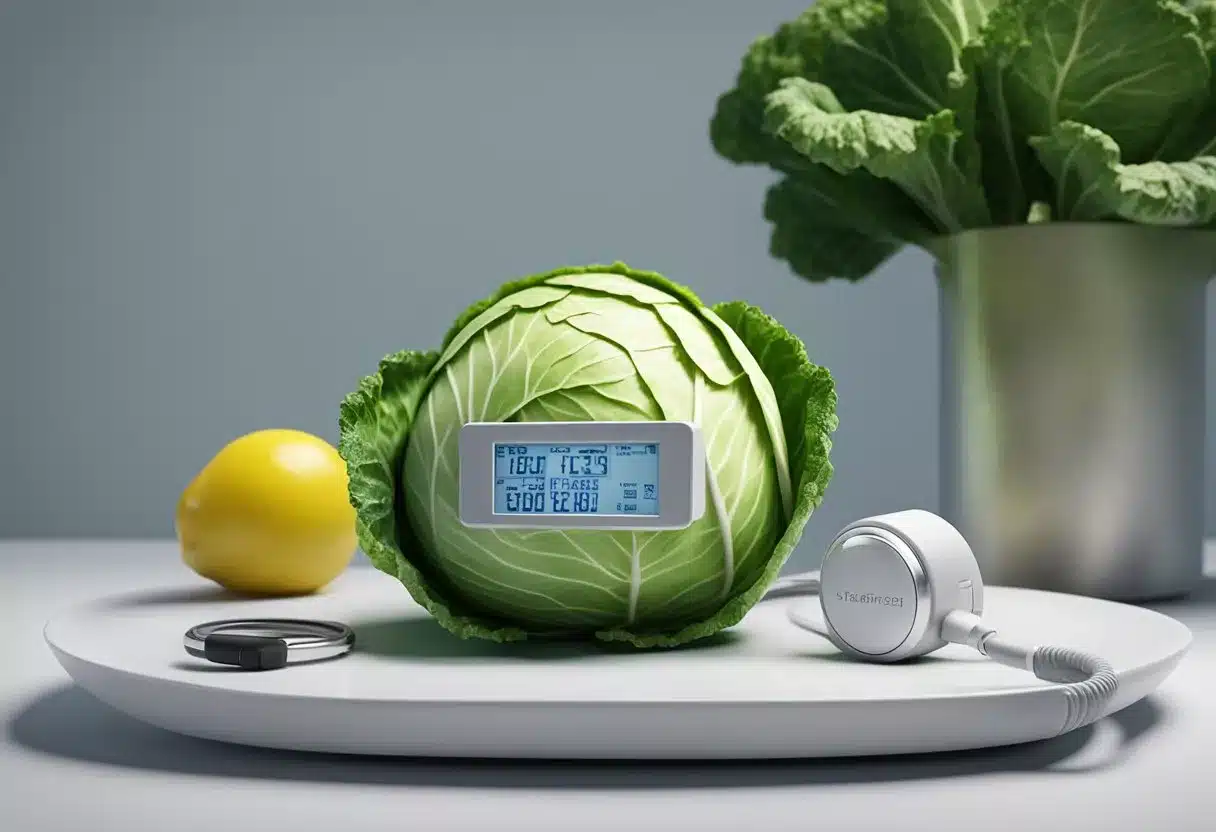
One of the key benefits of cabbage is its high fiber content, which can help slow down digestion and prevent blood sugar spikes. Additionally, it is low in calories and carbohydrates, fitting well within the dietary guidelines for diabetes management. Adding cabbage to meals can also positively affect heart health due to its vitamin C content.
Beyond blood sugar control, incorporating cabbage into a diet offers other health benefits such as aiding kidney functions and promoting a healthy gut. For diabetics, these advantages make cabbage a simple yet potent component of a balanced, nutritious meal plan.
Key Takeaways
- Cabbage helps moderate blood sugar levels after meals.
- High in fiber, low in calories and carbohydrates, beneficial for diabetes management.
- Offers additional health benefits such as supporting heart and kidney functions.
Understanding Blood Sugar and Diabetes

Blood sugar, also known as glucose, plays a vital role in providing energy for the body’s cells. Diabetes affects how the body processes glucose, often leading to elevated blood sugar levels due to issues with insulin production or function.
The Role of Blood Sugar in the Body
Blood sugar is the main source of energy for the body’s cells. When food is consumed, especially carbohydrates, it is broken down into glucose. Glucose then enters the bloodstream, where it can be used by cells for energy. The hormone insulin, produced by the pancreas, helps glucose enter the cells. Without proper insulin production or function, glucose remains in the bloodstream, leading to high blood sugar levels.
Insulin is crucial because it regulates blood sugar levels, ensuring cells receive energy. If blood sugar levels are too low, the body can experience hypoglycemia, leading to symptoms like dizziness and confusion. Conversely, high blood sugar levels can cause hyperglycemia, which can be harmful over time and lead to various health problems.
How Diabetes Affects Blood Sugar Levels
Diabetes is a condition where the body either does not produce enough insulin or cannot effectively use the insulin it produces. Type 2 diabetes is the most common form, often resulting from insulin resistance. In insulin resistance, the body’s cells do not respond well to insulin, causing elevated blood sugar levels.
Prediabetes is a condition where blood sugar levels are higher than normal but not high enough to be classified as diabetes. It is a warning sign and, if not managed, can progress to type 2 diabetes.
Managing blood sugar levels is crucial for people with diabetes. This can involve monitoring blood sugar, following a healthy diet, and sometimes taking medication. It is important to keep blood sugar within a target range to prevent complications such as nerve damage, kidney issues, and cardiovascular problems.
Nutritional Profile of Cabbage

Cabbage is packed with essential nutrients that are beneficial for health. It contains vital vitamins and minerals, is rich in fiber, and has low calorie and carbohydrate content.
Vitamins and Minerals in Cabbage
Cabbage is a good source of several important vitamins and minerals. It provides vitamin C, which boosts the immune system and promotes skin health. Another vital nutrient in cabbage is vitamin K, which aids in blood clotting and bone health.
Folate in cabbage supports cell function and tissue growth. Besides these, cabbage also contains necessary minerals like potassium, which helps in regulating blood pressure, and iron, which is crucial for transporting oxygen in the blood.
Fiber Content and Its Importance
Cabbage is rich in fiber, making it an excellent addition to a healthy diet. Fiber helps in maintaining digestive health by promoting regular bowel movements. It also aids in controlling blood sugar levels, which is particularly important for people with diabetes.
Including fiber-rich foods like cabbage in meals can help with maintaining a healthy weight by providing a feeling of fullness. This can prevent overeating and support long-term health.
Caloric and Carbohydrate Information
Cabbage is low in calories and carbohydrates, making it suitable for those monitoring their intake. A cup of raw cabbage contains about 22 calories and only 5 grams of carbohydrates. This low-calorie count makes it an ideal food for weight management.
Most of the carbohydrates in cabbage are from fiber, meaning it has a small amount of net carbs. Additionally, cabbage has minimal protein and fat, focusing primarily on micronutrients that support overall health. Including cabbage in a balanced diet can contribute to better blood sugar control and general well-being.
Cabbage’s nutritional profile provides a range of benefits that make it an excellent choice for maintaining health and managing conditions like diabetes.
Cabbage and Blood Sugar Control
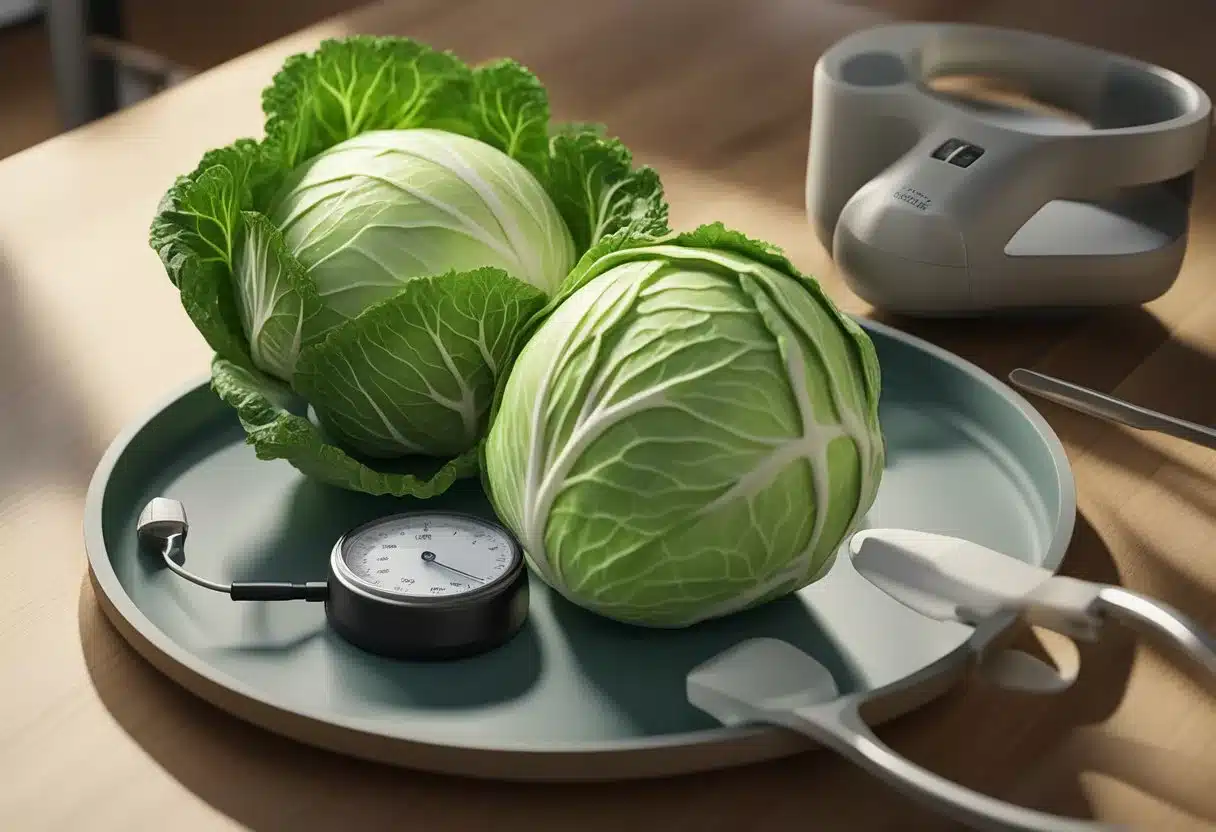
Cabbage can play a key role in managing blood sugar levels. It’s low in calories and carbohydrates, making it a good choice for diabetics aiming for stable blood sugar control.
Impact of Cabbage on Blood Sugar Levels
Cabbage, as a cruciferous vegetable, aids in maintaining stable blood sugar levels. It is high in fiber, which can help prevent blood sugar spikes by slowing digestion. This could be particularly beneficial for diabetics who need to manage their blood sugar closely. Additionally, cabbage is packed with antioxidants that can reduce oxidative stress, potentially leading to better overall blood sugar control.
Rich in vitamins and minerals, consuming cabbage can also introduce essential nutrients like Vitamins A, C, K, iron, and magnesium to the diet, further supporting healthy blood sugar levels.
Glycemic Index of Cabbage
The glycemic index (GI) of cabbage is quite low. Foods with a low GI are digested more slowly and cause a more gradual rise in blood sugar. This can help avoid the rapid spikes often associated with higher GI foods. Because of its low GI, cabbage is an excellent vegetable for those needing to control their blood sugar levels.
Diabetics can benefit from incorporating cabbage into their meals, as it helps keep blood sugar levels steady and provides satiety without adding many calories.
Insulin Response to Cabbage Consumption
Eating cabbage can also affect insulin sensitivity. High in fiber, the vegetable may help improve how the body responds to insulin, a crucial hormone for blood sugar management. This means that including cabbage in the diet could potentially lead to a more effective insulin response.
Due to its low carbohydrate content, cabbage does not heavily burden the blood sugar regulatory mechanisms, supporting better insulin function. This makes cabbage a suitable option for those looking to manage or improve their insulin sensitivity and overall blood sugar control.
Health Benefits Associated with Cabbage
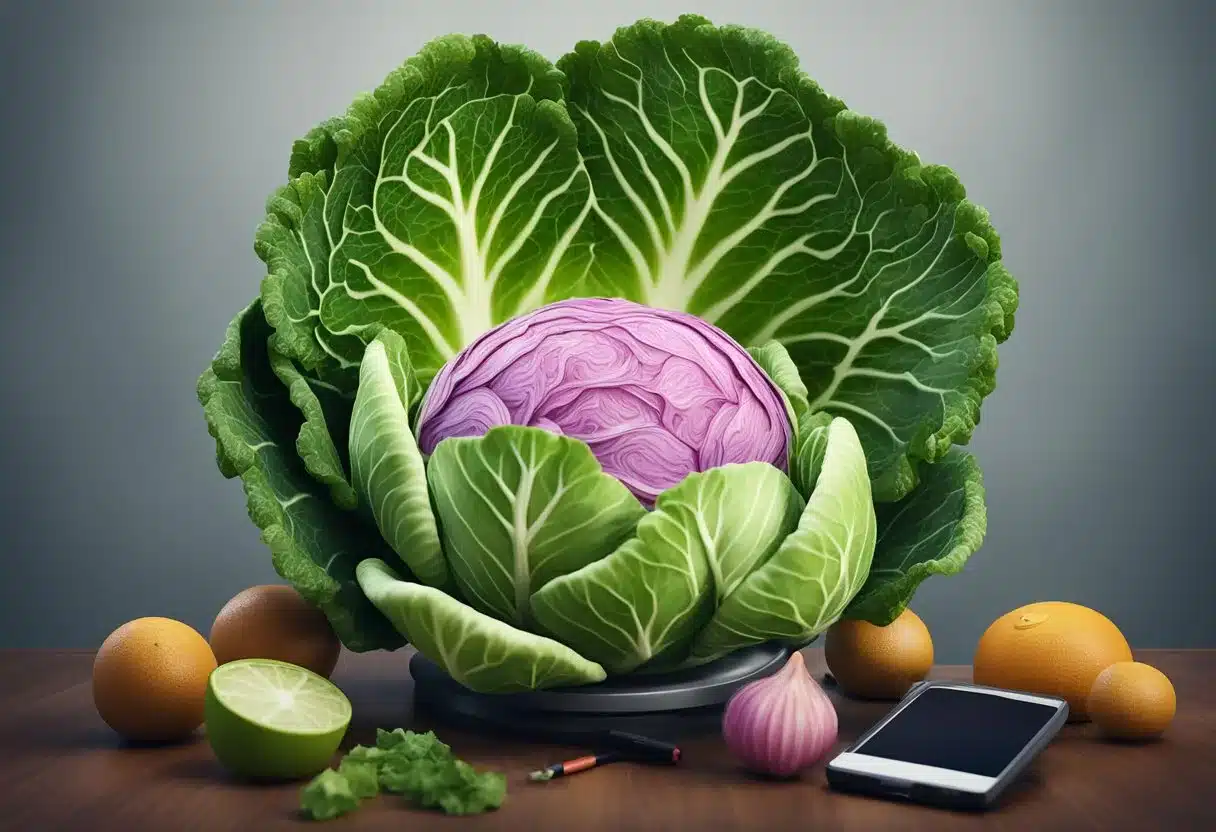
Cabbage is a nutrient-dense vegetable with a variety of health benefits. It can help reduce inflammation, improve heart health, support digestion, prevent certain cancers, and aid in weight management.
Antioxidant and Anti-inflammatory Effects
Cabbage is rich in antioxidants, such as vitamin C and anthocyanins. These compounds help protect the body from oxidative stress and reduce inflammation. Chronic inflammation is linked to various health problems like cardiovascular disease and certain cancers.
Incorporating cabbage into meals can help lower inflammation, providing significant health advantages, particularly for those with inflammatory conditions.
Heart Health Improvements
Eating cabbage can benefit heart health. It contains potassium, a mineral that helps regulate blood pressure, reducing the risk of heart disease. The high fiber content in cabbage aids in lowering cholesterol levels, which is crucial for maintaining cardiovascular health.
Including cabbage in your diet may contribute to better heart function and a lower risk of developing heart disease.
Digestive and Gut Health
Cabbage is excellent for digestion and gut health. This cruciferous vegetable contains probiotics and a high amount of fiber, which supports healthy gut bacteria and regular bowel movements. Fiber is essential for preventing constipation and promoting a healthy digestive system.
Moreover, probiotics found in fermented cabbage, such as sauerkraut, enhance gut health, making it easier to digest food and absorb nutrients.
Cancer Prevention and Management
Cabbage may aid in cancer prevention. The antioxidants and anti-inflammatory compounds in cabbage support the body’s defense against cancerous changes. Cruciferous vegetables like cabbage contain glucosinolates, which have been shown to inhibit the development of certain cancers.
Regularly consuming cabbage can be a part of a diet aimed at reducing the risk of various cancers, including colorectal and breast cancer.
Weight Management and Obesity Prevention
Cabbage is low in calories but high in nutrients, making it an excellent choice for weight management. Its high fiber content promotes satiety, helping individuals feel full for longer periods and reducing overall calorie intake.
Including cabbage in meals can aid in weight loss efforts and help prevent obesity by making people feel satisfied without consuming excessive calories.
Incorporating Cabbage into a Diabetic Diet
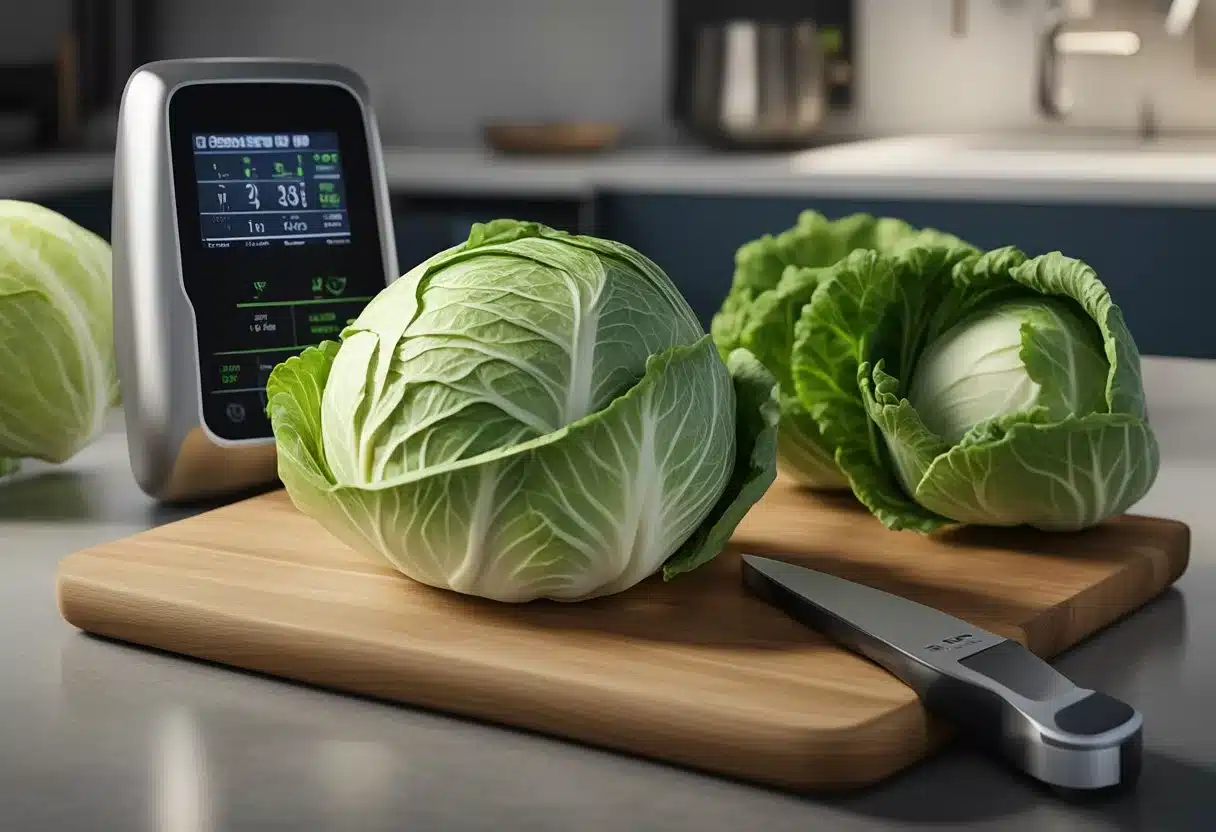
Cabbage is a versatile and nutritious vegetable that can be a helpful addition to a diabetic diet. It aids in blood sugar management and can be used in various tasty recipes and meal plans.
Cabbage-Based Recipes for Blood Sugar Management
Cabbage can form the base of many diabetes-friendly recipes. These dishes help control blood sugar levels due to the high fiber content of cabbage. Fiber slows the absorption of sugar into the bloodstream.
Soups with cabbage, like cabbage soup, are low in calories and filling. Combine cabbage with other non-starchy vegetables like carrots and celery for extra nutrients.
Salads are another great option. A fresh cabbage salad with lemon juice, olive oil, and a sprinkle of seeds can make a nutritious meal or side dish.
Stews with cabbage offer a warm and hearty dish. Use lean proteins such as chicken or tofu along with other non-starchy vegetables.
Meal Planning with Cabbage
Proper meal planning ensures that cabbage is integrated into the diet in a balanced manner.
When planning meals, consider including cabbage in multiple forms: raw, steamed, or sautéed.
For lunch or dinner, pair cabbage with lean proteins and healthy fats. Incorporate shredded cabbage into wraps or tacos for a crunchy texture.
Snacks can also include cabbage. Cabbage leaves can be used as wraps for various fillings, providing a low-calorie alternative to bread.
Ensuring that meals include a mix of protein, fiber, and healthy fats will help keep blood sugar levels stable throughout the day. Cabbage’s versatility makes it easy to fit into any meal plan for diabetics.
Comparative Analysis: Cabbage vs. Other Vegetables
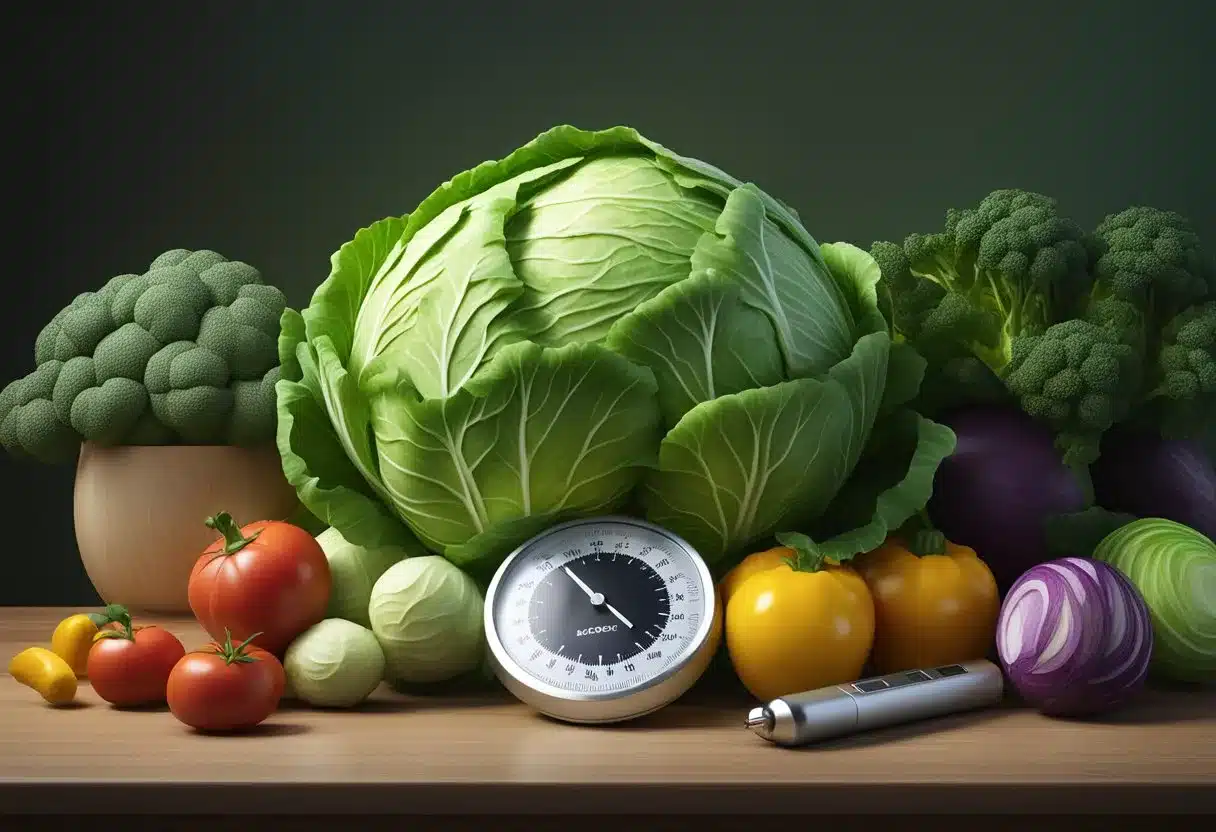
Cabbage is a powerful tool in managing blood sugar levels, but it’s important to compare it with other vegetables to fully understand its benefits. This analysis looks at nutrient-rich alternatives to cabbage and evaluates the differences between starchy and non-starchy vegetables in blood sugar control.
Nutrient-Rich Alternatives to Cabbage
Carrots, broccoli, and spinach provide valuable nutrients like fiber, vitamins, and antioxidants.
Carrots: High in fiber and beta-carotene; aids in glycemic control. They also offer a sweet taste, beneficial for adding variety without spiking blood sugar.
Broccoli: Rich in vitamins C and K, broccoli supports immune function and bone health. Its fiber content helps slow down sugar absorption.
Spinach: Loaded with iron and magnesium, spinach is beneficial for muscle function and blood glucose regulation.
Kale: Provides significant amounts of vitamins A and C. It acts as a powerful antioxidant to combat oxidative stress, which can affect diabetics.
These vegetables, like cabbage, offer low calories and high nutritional value, crucial for managing diabetes.
Starchy vs. Non-Starchy Vegetables in Blood Sugar Control
Non-Starchy Vegetables: Includes cabbage, green beans, zucchini, and asparagus. These vegetables are low in carbohydrates and calories, making them ideal for keeping blood sugar levels stable. They generally have a low glycemic index, meaning they do not cause rapid spikes in blood sugar.
Starchy Vegetables: Includes potatoes, corn, and peas. These are higher in carbohydrates, which can cause more significant increases in blood sugar levels if not monitored properly.
By choosing non-starchy options like cabbage, broccoli, and lettuce, individuals can better manage their blood sugar levels. The low-carb nature of these vegetables provides steady, manageable glucose levels and supports a healthy diet overall.
Frequently Asked Questions

Cabbage is beneficial for managing blood sugar levels, but there are some factors to consider in its consumption. Below are common questions related to its preparation, potential side effects, and interactions with the female reproductive system.
How should cabbage be prepared for a diabetic-friendly diet?
Cabbage can be cooked in several ways, such as steaming, roasting, or adding it to soups and salads. Steaming or roasting helps preserve its low glycemic index. Washing cabbage with a mixture of vinegar and water is recommended to remove pesticide residue.
What are the potential negative effects of consuming cabbage for women?
Women who consume cabbage may experience increased gas or bloating, which can be uncomfortable. It is important to moderate the amount of cabbage consumed and monitor any adverse reactions.
Can an excessive intake of cabbage be harmful to one’s health?
Eating too much cabbage can lead to digestive issues like gas and bloating. It might also interfere with iodine absorption, potentially affecting thyroid function. Moderation is key to avoiding these potential side effects.
How does cabbage consumption influence the female reproductive system?
There is no conclusive evidence suggesting cabbage directly impacts the female reproductive system. However, any unusual or prolonged symptoms should be discussed with a healthcare provider to rule out other causes.
Are there any adverse reactions associated with a diet focused on cabbage?
A diet heavily focused on cabbage might cause digestive discomfort such as gas, bloating, and diarrhea. Avoid making cabbage the sole focus of the diet and try to balance it with other vegetables.
Which vegetables should diabetics consider limiting or avoiding?
Diabetics should be cautious with starchy vegetables like potatoes and corn, as they can cause rapid spikes in blood sugar levels. Non-starchy vegetables, including cabbage, tend to have a more stable effect on blood sugar.
